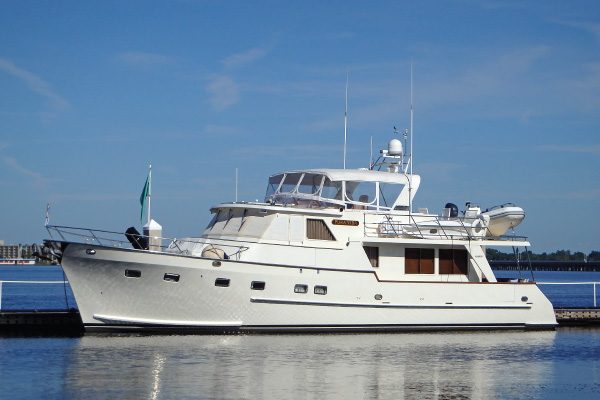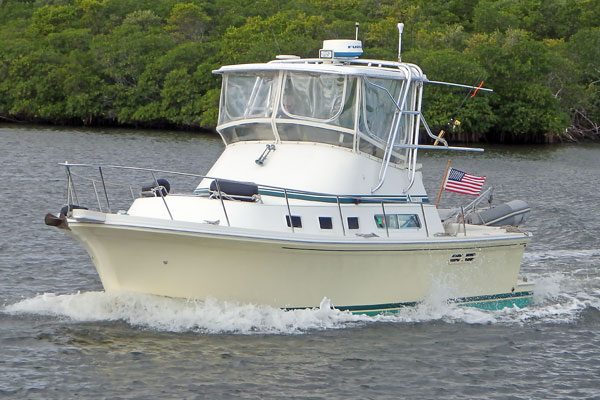No one expects you to understand the yacht brokerage business right away, that will take time. However, there are a few things you should realize that can greatly impact your decisions. At a certain point in your research, you will begin to feel comfortable that you have a feel for the types of trawlers available and a better understanding of pricing.
The trawler boating business is closely analogous to the home real estate market (you can think of a trawler as a mobile waterfront home!). Most future trawler owners are homeowners and have gone through the purchase of one or more houses. When finding the right home to buy, people take different approaches. Some drive around in their car to look at houses based on the neighborhood. Some find ads in the newspaper or scour the internet. Most use a real estate agent to help find and secure their perfect home. Similar to how property developers parcel tracts of land to build new homes, boat builders create molds and equipment to build new trawlers. Additionally, the buying and selling process is very similar in that brokers earn commissions as a percentage of the sale price when the transaction closes.
In the boating business most trawlers are listed for sale by a brokerage “house” with an agent who manages the specific boat listed for sale. Most buyers find trawlers for sale in magazine ads, on the internet, or at boat shows. Every yacht salesperson who fields a call or replies to an email about one of their listings assumes that the potential buyer is a “free agent” and not attached to another broker, so is “fair game”. What many buyers do not realize is that when you reach out to connect with a yacht salesperson you have just established a relationship with that person and become “their property” in the form of a sales lead.
Buying a trawler can seem like a daunting process, filled with too many decisions. Working with a yacht broker can help decrease the decision burden and help you find the perfect trawler.

New vs. Used
There are pros and cons to buying a new or used trawler. If you have the time, patience, and budget – buying a new trawler is the best way to get exactly what you want. With a new trawler, you can get the newest features and equipment, state of the art electronics and entertainment, the optimum layout, with the certainty that you are the original owner. However, you will pay a premium for this privilege.
New Trawlers
New boats require a deposit at contract signing, and construction payments throughout the build process. It is exciting to visit the yard and see your boat come to life. Some trawler owners only buy new and boat builders are eternally grateful to those who share their preference for the “latest and greatest”. Most trawler brands continue to evolve with new models and incorporate the lessons learned. The result is that each new hull is better than the one before. Working closely with the builder to create your optimum trawler ensures your boat suits your needs perfectly.
Another option is to purchase your trawler from a dealer. Often, you can negotiate a deal with dealers for the boats on the showroom floor. This tends to be faster than having your new boat built.
Two major cost decisions that new trawler buyers enjoy choosing are their navigation/communications electronics and their tender. Additional costs to set up a new trawler include bedding, towels, carpeting, interior décor, galley ware, privacy blinds, canvas goods, tools, spare parts, along with any personal purchases to complete the outfitting.
An experienced yacht broker should advise their clients to study the used trawler market (even if they are only interested in a new build) so that they can better understand the layout and equipment choices. Then, when picking a new trawler, they make decisions based on which selections work best for them and budget for the extra items mentioned above.
Eventually, all new boats come on the market as used or “brokerage” boats. A brokerage trawler always provides the best value, however the model and features you desire may not be on the market when you are looking and in a position to purchase.
Once you know the trawler you are targeting, your decision narrows down to price and location. It can be helpful to determine how much it will cost to buy the trawler you want. Unfortunately, this can be difficult as there are many expenses involved in not only purchasing the boat, but also in storing and maintaining it. Some of the additional expenses include the “fix-it-up” price, surveyor fees, bank loans, taxes, insurance, and slip rent. An experienced yacht broker can help you work through your budget and provide contacts and resources.
Used Trawlers
At some point, all trawler owners decide to sell their boat. They either sell it on their own or hire a broker to market the boat for them. All boats on the MLS (multiple listing services) are sold through brokers and the seller has authorized the broker to actively represent the seller to find a buyer.
Yacht brokers, like real estate agents, aren’t paid a salary, have no medical benefits, most likely do not have profit sharing or a pension plan and instead survive on one source of income- a commission. Commissioned sales are only paid upon the successful completion (closing) of a sale and typically the Broker (house) splits the commission with the agent (salesperson). In simplest terms a listing agreement, a written contract that a seller signs, includes an asking price, an agreed commission, outlines the arrangements for showing the boat and authorizes the broker to advertise, promote, and solicit offers.
A trawler listed for sale by a brokerage firm will typically have an agents name attached to that boat as the “face of the boat” through which all inquiries are coordinated. The seller works with the agent before signing a listing agreement to authorize a brokerage house to market their trawler. There are two types of listings, a Central/Exclusive where only one house can advertise the trawler, or an Open listing where the seller can select as many brokerage firms as they wish to market their trawler. An Open listing can confuse the marketplace, particularly if the same boat is offered for sale at different prices. Keep this in mind and make sure you aren’t comparing the same boat offered for sale by multiple outfits.
As you research trawlers, you may come across one you would like to learn more about. Maybe the listing is detailed and inspires you to call to find out more and arrange to get aboard. The listing could be a bit vague, prompting questions about what are seemingly obvious missing details. At this point, you’ve reached a critical step in the process and what you do next can dramatically affect how things play out.

Remember, the Seller hired the broker to sell their trawler. When you contact this same broker you are a new and secondary relationship. Now, most brokers have high ethical standards and a fiduciary responsibility to buyers and sellers, but more and more buyers are coming to realize that in making a sophisticated trawler purchase they are truly best represented by selecting their own “buyers broker” or “trawler advocate,” someone whom they selected based on reputation and product knowledge to be on their side and conduct the negotiations for them.
In all brokerage transactions the seller has agreed to include a commission. This is part of the listing agreement – what price to ask for and how much the seller will pay in commission if that price is achieved. The seller is really looking at a net number – what they would like to have in their pocket when the transaction is closed. But they have to add the commission and some “wiggle room” on top of that to develop their asking price. The seller usually isn’t too concerned with how the commission is divided up, but the listing broker would much prefer to represent both sides of a deal in order to keep better control of the transaction and realize a higher commission. If a broker tells you “don’t worry, the seller is paying the commission” be aware that this isn’t really true. The buyer is really the person who is paying the commission as a part of the total purchase price.
It is not at all uncommon for a listing broker in a trawler transaction to work in a “dual-agency” role representing buyer and seller – it is important for this fact to be disclosed in any offer and signed off as agreed to by both buyer and seller.
Before you contact the listing broker to ask about a particular trawler you should understand what your choices are by reading more about brokers.
